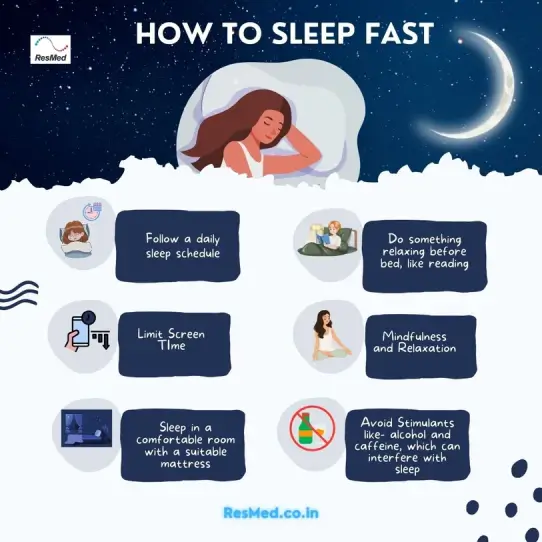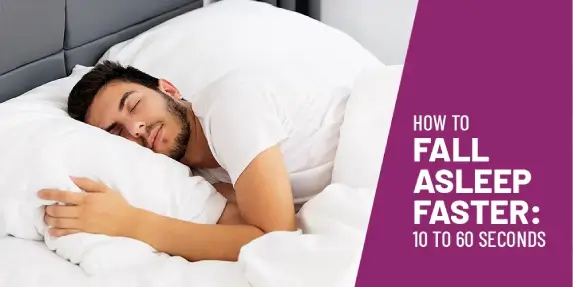Do you find yourself tossing and turning at night, unable to drift off? Sleep specialists reveal that certain habits and techniques can help you fall asleep faster and achieve a more restful night. Here’s a comprehensive guide to optimize your sleep routine and get to dreamland in no time.
The Science of Falling Asleep
Falling asleep involves a complex interplay between your circadian rhythm, melatonin production, and relaxation techniques. Factors like stress, screen time, and irregular sleep schedules can disrupt this process. Sleep specialists emphasize creating a conducive environment and practicing sleep-inducing habits to align your body with its natural sleep-wake cycle.

Tips to Fall Asleep Faster
1. Create a Relaxing Bedtime Routine
Engage in calming activities before bed to signal to your brain that it’s time to sleep. Consider:
- Reading a light, non-stimulating book (avoid page-turners or thrillers).
- Practicing meditation or deep-breathing exercises.
- Taking a warm bath to relax your muscles.
2. Optimize Your Sleep Environment
Your bedroom should be a sanctuary for sleep. Sleep specialists recommend:
- Keeping the room cool, ideally between 60-67°F (15-19°C).
- Using blackout curtains to block light.
- Eliminating noise with white noise machines or earplugs.
- Investing in a comfortable mattress and pillow.
3. Limit Screen Time Before Bed
Blue light from phones, tablets, and computers can suppress melatonin production, making it harder to fall asleep. Aim to:
- Turn off screens at least an hour before bed.
- Use blue light-blocking glasses if you must use devices.
4. Practice the 4-7-8 Breathing Technique
This simple method helps calm your nervous system:
- Inhale through your nose for 4 seconds.
- Hold your breath for 7 seconds.
- Exhale slowly through your mouth for 8 seconds. Repeat this cycle four times to ease into relaxation.
5. Avoid Caffeine and Heavy Meals Before Bed
Caffeine and large meals can disrupt your body’s ability to relax. Specialists suggest:
- Avoiding caffeine after 2 p.m.
- Eating dinner at least 2-3 hours before bedtime.
- Opting for a light snack if you’re hungry, such as a banana or yogurt.
6. Stick to a Consistent Sleep Schedule
Going to bed and waking up at the same time every day helps regulate your circadian rhythm. Avoid sleeping in on weekends to maintain consistency.
7. Use Progressive Muscle Relaxation (PMR)
PMR involves tensing and then relaxing each muscle group in your body. Start from your toes and work your way up to your head, releasing tension along the way.
8. Limit Alcohol Consumption
While alcohol may initially make you feel drowsy, it can disrupt your sleep cycle and reduce the quality of your sleep. Limit alcohol intake, especially in the evening.
9. Write Down Your Worries
If racing thoughts keep you awake, jot them down in a journal before bed. This practice helps clear your mind and reduces nighttime anxiety.
Common Myths About Falling Asleep
Myth 1: Lying in Bed Will Eventually Lead to Sleep If you’re unable to sleep after 20 minutes, get up and engage in a relaxing activity. Staying in bed can lead to frustration, making it harder to sleep.
Myth 2: Watching TV Helps You Fall Asleep The blue light from screens can interfere with melatonin production. Opt for audio content like podcasts or relaxing music instead.
Myth 3: Alcohol is a Good Sleep Aid While it may help you fall asleep initially, alcohol disrupts REM sleep and can cause frequent wake-ups during the night.
FAQs About Falling Asleep Fast
Q1: What is the best position to fall asleep quickly? The position that’s most comfortable for you is ideal. However, lying on your back with arms at your sides or on your stomach with your head to the side can promote relaxation.
Q2: Can supplements help me fall asleep faster? Melatonin, magnesium, and valerian root are commonly used supplements. Consult a healthcare provider before using them.
Q3: Why can’t I fall asleep even when I’m tired? Stress, poor sleep habits, or underlying conditions like insomnia may be the cause. Evaluate your routine and consider seeking professional advice.
Q4: Is it okay to nap during the day if I have trouble sleeping at night? Limit naps to 20-30 minutes and avoid napping late in the day to prevent interference with nighttime sleep.
Q5: How long should it take to fall asleep? Ideally, it should take about 10-20 minutes to fall asleep. If it takes much longer, assess your habits and environment.
References
- Walker, M. (2017). Why We Sleep: Unlocking the Power of Sleep and Dreams. Scribner.
- National Sleep Foundation. (2025). How to Fall Asleep Fast. Retrieved from https://www.sleepfoundation.org.
- Harvard Medical School. (2023). Understanding Sleep Problems. Retrieved from https://www.health.harvard.edu.
- American Academy of Sleep Medicine. (2025). Techniques for Falling Asleep. Retrieved from https://aasm.org.
Conclusion
Falling asleep faster is possible with the right techniques and habits. By optimizing your environment, sticking to a routine, and employing relaxation strategies, you can enhance your ability to drift off quickly. If sleep troubles persist, don’t hesitate to consult a sleep specialist for further guidance.


